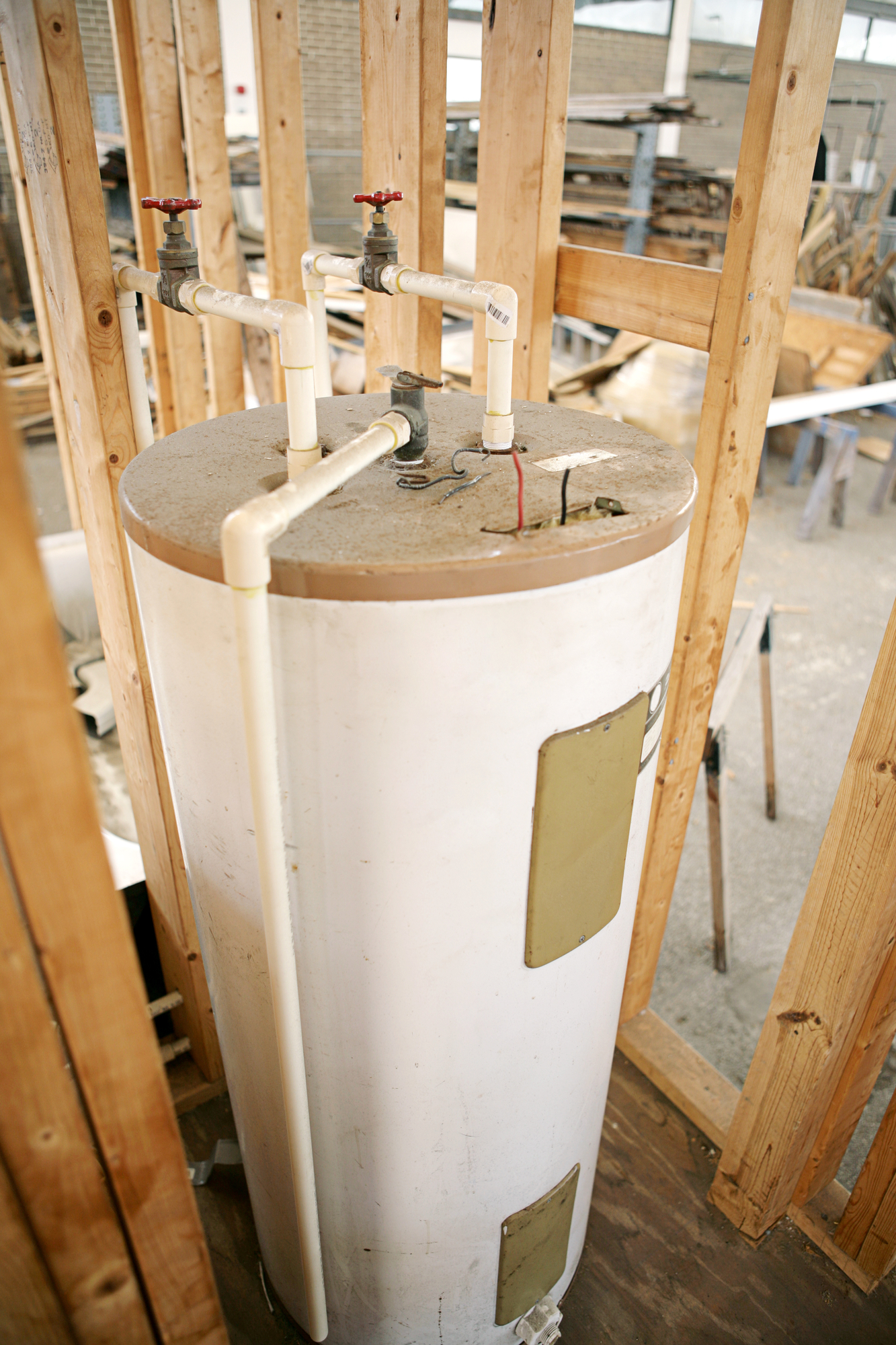Seattle Water Heaters
Solar Water Heater
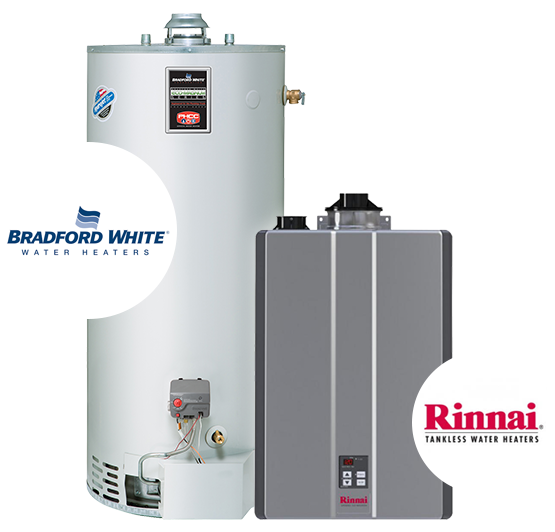
Are you looking for a strategy to save money on energy while also preserving the environment? Think about investing in a solar water heater in Seattle. Solar water heaters are an excellent method to lower your carbon footprint and save money on your energy bill.
To choose the best solar water heater for your home, you should do some study as there are many different varieties available. When selecting a solar water heater in Seattle, you should also consider the climate of your particular area as some types function better in particular regions than others.
Finding a reliable installer is the next step after choosing the sort of solar water heater that will work best for your home or place of business. The many varieties of solar water heaters will be explained to you by a competent installer, who will also be able to give you a reasonable estimate. Please consider Seattle Water Heaters as we have invested a great deal of time, money and effort in training our team on the advantages of solar energy for heating water. If this kind of natural power source appeals to you, we are prepared to provide some excellent options.
We provide a free consultation during which we can go over the advantages of solar water heaters, how they can reduce your energy costs, and how they can help the environment. Together, we’ll determine the finest solar water heater for your home and financial situation. We’ll also provide you with a competitive installation quote.
Get in touch with us right away to find out more about our Seattle solar water heater services!
Why Choose a Solar Hot Water Heater?
Installing a solar water heater is an excellent way to save your energy costs and contribute to environmental sustainability by lowering your carbon footprint. Solar water heaters heat water in a storage tank using the sun’s energy. The hot water can then be used for daily chores like dishwashing, laundry, and showers.
A solar water heater has several advantages even though it won’t directly lower your water usage. Here are a few:
-
Combating climate change
17 percent of the energy used in a typical home is used for water heating. Natural gas or other fossil fuels are used to heat the water in many homes in North America. That is a significant amount of carbon entering the atmosphere. A wonderful method to lower carbon/greenhouse gas emissions and contribute to saving our planet is to switch to solar hot water.
-
An increase in home value
According to studies, homes with solar power sell more quickly and for more money than those without. So, whether you decide to stay in your property or sell it, investing in solar hot water will pay off.
-
Preserving air quality
In many houses, water is heated using electricity. Burning coal provides more than one-third of the nation’s electricity. Our air is contaminated by particles and other coal-burning pollutants, which has a significant impact on our environment and our health. You contribute to the solution to these public health issues when you use solar water heaters.
-
Cost savings
Even in temperate climates, a solar water heater may meet up to 80% of your hot water needs. This results in significant monthly utility cost savings. In actuality, a solar hot water system can be expected to survive for at least 40 years and often pays for itself in just four to eight years. That’s a significant amount of free energy and cost savings.
-
Preserving water quality
There are more consequences of burning fossil fuels besides carbon and particles. Power plants are the main source of mercury and other harmful heavy metals released into the environment each year, according to the Natural Resources Defense Council. These pollutants pose a serious risk to both human health and the health of our rivers, streams, and lakes. One realistic action we can take to stop mercury pollution in our watersheds is solar water heating.
Clearly, the sun doesn’t shine constantly. Most solar water heaters have a backup gas or electric water heaters that come on when there isn’t much sunlight. However, a lot of people who own solar water heaters favor using backup heating as little as possible. They instead make a game out of using their hot water when it is most available. Even small behavioral changes, like washing laundry on sunny days, can result in significant financial and environmental benefits.
Many of these homeowners claim that being aware of how much hot water they use has helped them become more conscientious about how they use all of their resources. Despite the fact that their solar water heater doesn’t directly conserve water, they discover that overall, they are consuming less water and saving even more money.
Solar Water Heaters: What Are They?
Although they can also be erected on the ground, solar water heaters are commonly installed on the roof of a building. To ensure that the system is installed correctly and complies with all local building requirements, it is crucial to talk with a professional installer if you are thinking about installing a solar water heater. Numerous companies, including home improvement stores, online merchants, and specialized solar dealers, offer solar water heaters for sale.
Active and passive solar water heaters are the two primary types. While passive solar water heaters rely on natural convection to circulate the water, active solar water heaters use pumps to move the water through the solar collector. Although more expensive than passive solar water heaters, active solar water heaters are also more effective. Since the pump won’t have to work as hard to circulate the water, passive solar water heaters are a suitable option for people who don’t want to install an active system or who live in a region with harsh winters.
It is critical to choose a solar water heater that is appropriately sized for your needs. The size of a solar water heater can range from a small unit that can heat only one sink of water to a large unit that can heat all the hot water for an entire house. Choosing a solar water heater that has received certification from the Solar Rating and Certification Corporation (SRCC) is also crucial. The SRCC is an independent company that evaluates and tests solar technology. You can be sure that your investment will be profitable in the long term by selecting a solar water heater with an SRCC certification.
A solar water heater is quite easy to install. The majority of systems come with all the required hardware and installation instructions. There are numerous qualified contractors, though, that can perform the installation for you if you don’t feel comfortable doing it yourself. The cost of professional installation may be higher, but it will guarantee that the task is done right the first time.
If you want to save money on your energy bills, installing a solar water heater is a fantastic way to go. More people are using solar energy to meet their energy needs as a result of the rising cost of energy. Solar water heaters can meet a sizable percentage of your home’s hot water requirements while also lowering your monthly energy costs.
There are a few things to consider if you’re thinking about installing a solar water heater. You must first choose between an active and passive system. As mentioned earlier, while passive systems rely on convection, active solar water heaters circulate the water using pumps and fans. Although active systems are more expensive, they are also more efficient.
The next step is to choose the type of collector you wish to employ. Flat plate and evacuated tube collectors are the two basic types. Although flat plate collectors are less expensive than evacuated tube collectors, they are also less efficient. The best option for you would probably be a flat plate collector if you reside in a region with a lot of sunlight (since the plentiful sunshine will make up for its lack of efficiency).
Finally, you must choose how to keep the water that has been heated by the sun. Two alternatives are available: a tankless system or a storage tank. There is no need to store heated water thanks to tankless systems. On the other hand, storage tanks are able to supply hot water for a number of days or even weeks.
You can start looking for solar water heaters now that you are aware of the kind of system and collector you want. Today’s market offers a wide range of brands and models, so take your time and select the one that best suits your demands. Before making a purchase, make sure to read internet reviews to make sure you are obtaining a high-quality product.
Installing your solar water heater is the next step after purchasing one. This task shouldn’t be challenging because the majority of systems come with comprehensive instructions. There are several professionals who can perform the installation for you if you are not comfortable doing it yourself. Just make sure to acquire multiple quotations before choosing who to hire.
The last step is to maintain your solar water heater after it has been installed. Make sure you routinely check the system’s water and glycol levels. Glycol can accumulate and result to issues, therefore it’s crucial to monitor it. Additionally, be sure to bleed the system every few months to get rid of any possible air bubbles. You can have unlimited free hot water for many years by following these easy instructions.
What Kinds of Solar Water Heaters Are There?
Solar water heaters come in three primary categories:
- Active solar water heaters circulate water or other fluids through the collector as they are heated by the sun using pumps or fans.
- Passive solar water heaters use gravity and natural convection to move water or other fluids through the collector where the sun heats them.
- Hybrid solar water heaters efficiently heat water or other fluids by combining active and passive solar technology.
Active solar water heaters are more prevalent in business settings, whereas passive solar water heaters are more common in residential places. The efficiency of active solar and the ease of passive solar are combined in hybrid solar water heaters to provide the best of both worlds.
You can be confident that whichever type of solar water heater you select will give you a clean, sustainable, and economical way to heat your water
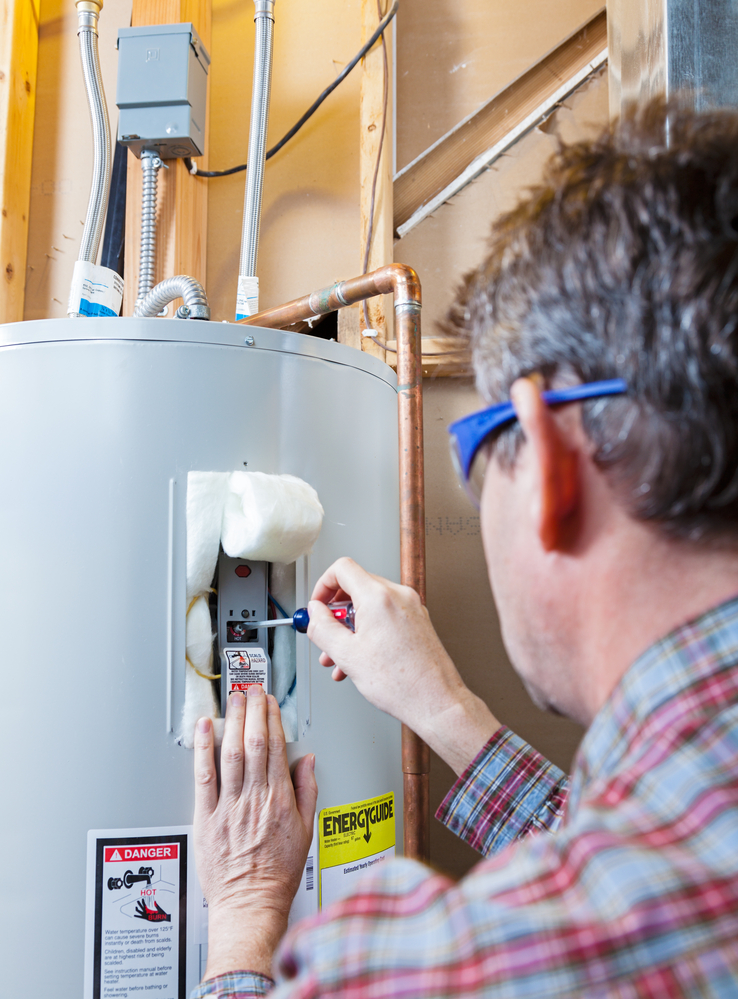
What Is the Cost of a Solar Water Heater?
The benefits of a solar water heater system are numerous, and they all appeal to those who are trying to reduce their carbon footprint. We’re talking about monthly utility bill reductions of 50% to 80%, state and federal tax deductions, and even electric company reimbursements. With labor and supplies included, the average cost to install a solar water heater is $3,500 but can range from $1000 to $5,000.
How much do solar water heaters cost, according to size?
The size of your system depends on how much warm water you use frequently, just like a typical hot water heater. Do numerous teens in your home take multiple showers each day? Or are there just the two of you using the same restroom?
Each component of your system will be bigger the more people and water sources you have in your house. The essential components are:
- Solar energy collectors, also known as solar panels
- Tank for storing hot water
- Plumbing to link the system to your home
The collector style also has a lot to do with your final cost.
Cost of labor and parts
The basic components for a solar water heater system range in price from $1,500 to $4,000. Add an additional $1,000 to $2,000 for extra pipes, backup heaters, or switches to operate the system. The number of solar panels, which range in price from $800 to $1,500 per panel, is also important.
The final step is to figure out labor costs, which make up a significant amount of the estimate. Installing a solar water heater typically costs $70 per hour. Even while most installs take a few days, the time required will vary depending on:
- How big your home is
- If a pool needs to be heated
- Temperatures and the amount of sunshine in your area
- How big your system is
- Your solar collectors’ location (it takes more time to install them on a roof)
A solar water heater expert will probably perform some simple calculations when you meet with them to establish the size of your tank and the required quantity of solar panels. The following price ranges are generally what you can anticipate for each tank size.
Tank with a 50-gallon capacity
Two persons can easily enjoy a 50-gallon tank combined with a 40-square-foot collector for an average cost of $2,500 for labor and parts.
Tank with an 80-gallon capacity
This size links to roughly a 60-square-foot collector, is excellent for a family of three or four people, and costs about $3,500.
Tank with a 120-Gallon Capacity
A larger tank of this size and up to 80 square feet of collection panels are needed for large households of five or six people. The installation of this system costs about $4,500.
What does it cost by type to install a solar water heater?
There is a significant distinction between passive and active solar water heater systems. They differ not just in price but also in how well they work in various parts of the USA.
Passive systems
Integrated collectors and thermosyphon systems range in price from $1,000 to $3,500 (before labor costs). Passive systems, which do not have a backup heater, rely on the sun’s heat and frequently have intricate piping to separate the cold and hot water.
Although they are initially less expensive than the active systems, they are also heavier and less dependable in cold climates.
Active systems
Active systems are much more prevalent in homes opting for a long-term, sustainable water heating technique, despite having greater upfront costs. The two systems, known as direct and indirect, typically cost between $2,500 and $4,500.
While indirect systems use a heat exchanger and antifreeze to operate throughout the winter, direct systems perform best in warm climates. These installations also have electric or gas backup generators, eliminating the chance of an ice-cold shower on a cloudy day.
They are heavier and less trustworthy in cold climates than the active options, although initially costing less than those options.
They are heavier and less trustworthy in cold climates than the active options, although initially costing less than those options.
What solar water heater types are available for my budget?
Although solar energy can pay for itself over a number of years, it’s crucial to budget for the initial investment. By choosing a smaller tank, a passive system, or working with a specialist who can choose the best location for your panels, you can reduce initial costs. Let’s examine a few price points.
$1,000 to $2,000
If you reside in a smaller home without a continual need for hot water, you should budget in this price range. A 50-gallon tank fits within this category, especially if you choose for a passive system or reside in an area with less solar collector requirements (a region with a lot of sunshine).
$2,000 to $3,000
Most installations of solar water heaters fall within or just over this range. Think of a tank that is little or medium-sized and uses an active system.
$3,000+
Once you are willing to spend more than $3,000, consider an 80- or 120-gallon tank. If your property needs more substantial solar panels, a direct active system, or intricate plumbing, the cost could increase.
What is the cost of do-it-yourself solar water heater installation
Technically speaking, a solar batch water system—also referred to as integral collector storage (ICS)—can be considered a do-it-yourself project. Some homeowners have had luck coupling this relatively straightforward system for under $1,000 with a typical tank. A batch collector must be placed in an insulated box and placed in an area that receives a lot of direct sunshine throughout the day.
But not all states allow homeowners to set up a hot water system without a professional license and permit. The DIY alternative is also not suited in areas with freezing temperatures or frequent cloud cover if it is a passive system without a backup heater.
To put it another way, we advise consulting a professional to ensure a safe, lawful, and efficient solar heating system installation.
What Size Solar Water Heater Do I Need?
Your household’s demand for hot water, the climate of the area you reside, and other considerations will all affect the size of solar water heater you’ll require. However, most homes will generally need a system that can provide at least 50 gallons of hot water each day.
If you reside in a region with extremely cold winters, a larger system might be necessary to heat enough water for your needs. Or you can choose a larger system if your family uses a lot of hot water for activities like showers and laundry.
The size of a solar water heater is also influenced by orientation. You will require a larger system to make up for the fact that your home is positioned in a way that limits its exposure to the light.
It is essential to speak with a solar water heating specialist at Seattle Water Heaters to decide the perfect size for your home. They can help you assess your unique requirements and suggest the best solution for your home.

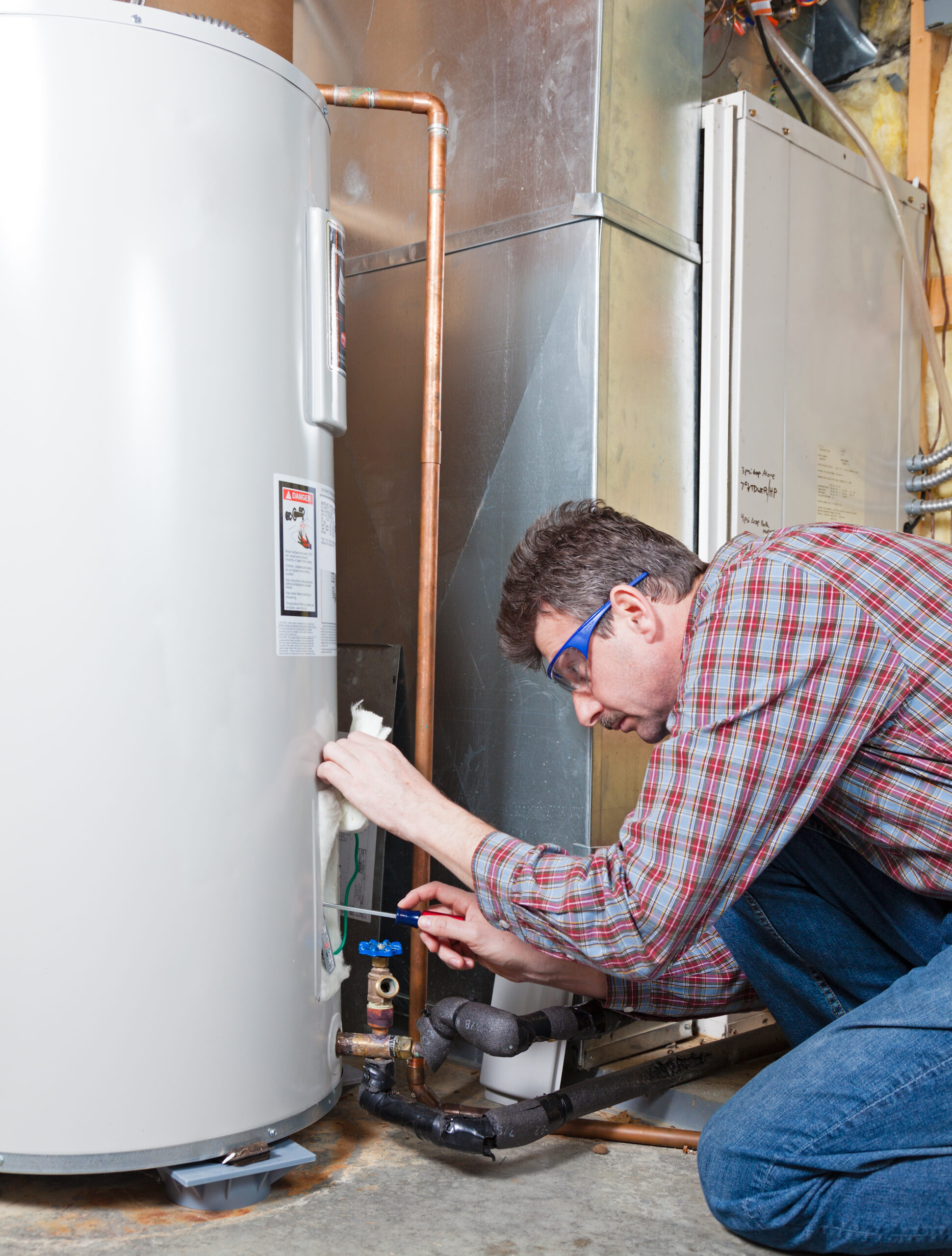
Do Solar Water Heaters Work During the Winter?
Yes, solar water heaters can function during the winter. In actuality, they are created to function year-round, regardless of the weather. Solar water heaters use the energy from the sun to heat the water, thus they can function as long as there is sunlight. However, because the sun is not as bright and the days are shorter in the winter, solar water heaters may not be able to heat water as speedily or as effectively as they would in the summer.
Because of this, you might need to employ a backup heating source, like an electric heater, to ensure that your hot water needs are met. Solar water heaters are great, but it’s important to remember that they might not be as efficient in the winter as they are in the summer. You can always get in touch with our solar water heater specialists to see if they have any suggestions or advice on how to make sure that your system is working and capable if you are concerned that your solar water heater won’t be able to meet your hot water needs during the winter.
Can Tankless Water Heaters Work with Solar Power?
The issue of whether solar panels can power a tankless water heater is sure to come up as more and more people choose solar energy as a way to reduce their energy costs. The good news is that a tankless water heater can absolutely be powered by solar panels! Here is a little explanation of how it operates:
Solar energy is captured by solar panels and transformed into electrical energy. Your tankless water heater and other home electronics can then be powered by this electrical energy. You must set up a solar panel system on your house in order to use solar energy to run your water heater. After the system is installed, you must use special wiring to connect it to your water heater.
Once installed, your solar power system will power your water heater whenever the solar water heater is out. You won’t ever have to be concerned about your water heater running out of power or not being able to keep up with demand thanks to this. Tankless water heaters can be powered by solar panels, which is a great way to reduce your energy costs over time.
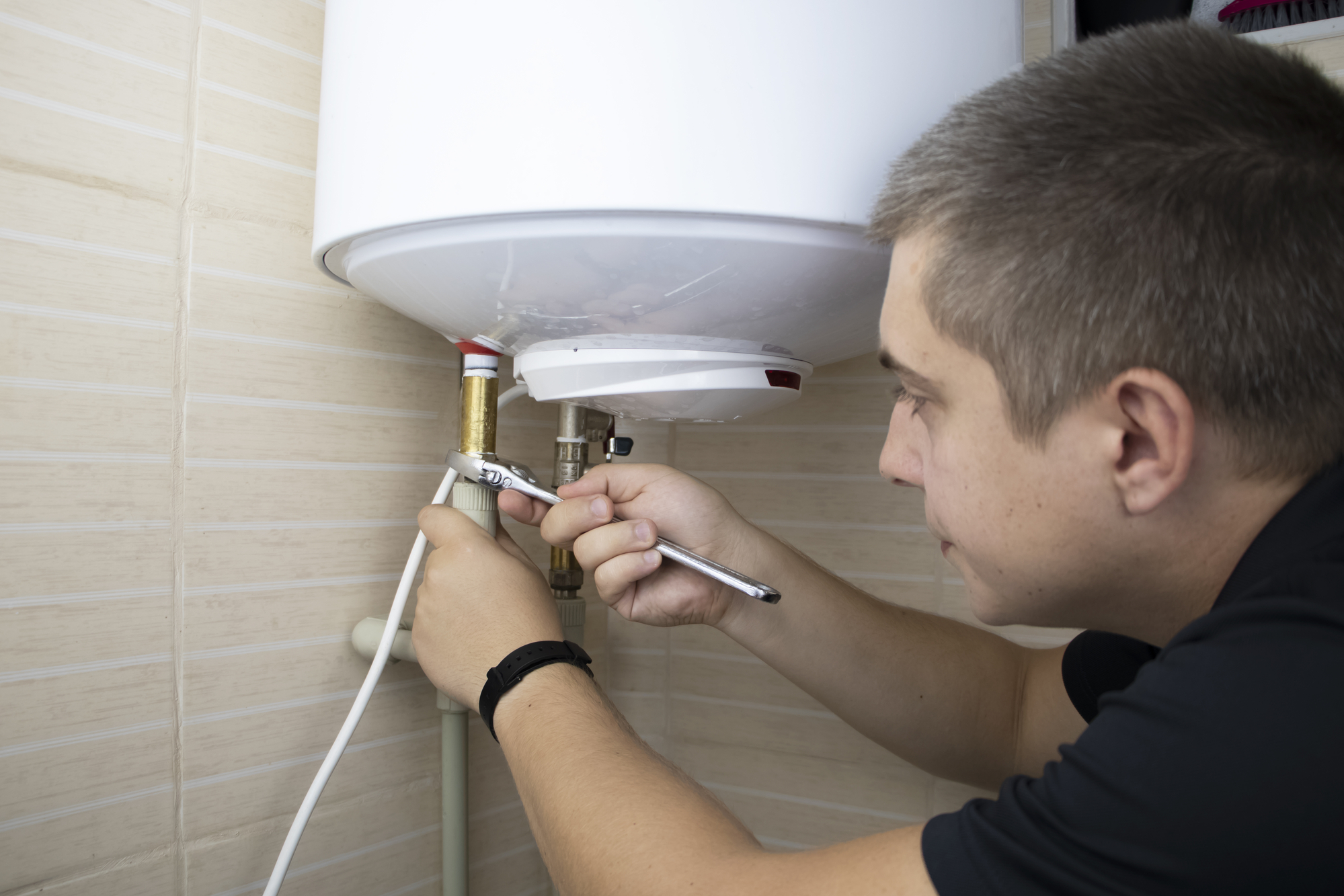

Should I Get an Electric Water Heater to be Powered by Solar Panels?
When determining whether or not to purchase an electric water heater to have it powered by solar panels, there are a few factors to take into account. The initial installation cost is the first factor. You’ll need to consider the cost of solar panels when making your choice. You should also take into account the continuous expenses of maintaining an electric water heater. These could involve things like the cost of electricity and maintenance services. And consider how frequently you will actually use the water heater. Solar might not be the ideal choice for you if you frequently use hot water and live in a cold climate. But solar energy could be a wonderful solution to reduce your energy costs if you don’t frequently use hot water and live in a warmer climate.
Solar water heaters are more cost-effective in the long run than electric water heaters because of their higher efficiency. Also consider the effect on the environment. Electric water heaters powered by electricity have a significantly greater negative effect on the environment than those powered by solar energy. So, going solar is the way if you want to save money and protect the environment!
Which Is Better: Solar Water Heater or Electric Water Heater?
Solar water heaters are the way to go if you want to choose sustainability over convenience. Using nonrenewable energy sources for your water heaters is unsustainable. But electric water heaters still have their advantages.
So, we’d rather give you the whole story so you can decide for yourself. Here are a few things to think about:
Installation
Electric water heaters can be installed in bathrooms, basements, and even under sinks. Unfortunately, using solar water heating equipment limits your freedom. These environmentally friendly water heating systems’ collectors need a lot of room and exposure to the sun. For gloomy or wet days, you could also require electrical boosters as a backup.
So, for smaller homes, electrical water heating systems might be a more practical choice.
Energy efficiency and cost-effectiveness
When comparing price, solar-powered systems outperform electric water heaters. This is due to the average 12.03 kWh/day consumption of electric water heaters. Depending on the appliance’s size and usage, operation costs come to $457.54 per year at this rate. Solar water heaters, on the other hand, are around half as expensive because they run on free solar energy.
You also won’t have to worry about paying monthly water heating expenses. You won’t experience any issues with the rapidly fluctuating utility prices if you install a solar water heater. As a result, within 2–5 years of use, these green heaters manage to pay for themselves. While they are in use, electric heaters continue to drain your bank account.
Impact on the environment
Families that care about the environment prioritize the carbon footprint and emissions when picking between an electric water heater and a solar water heater. In that regard, solar-powered heating systems are clearly superior.
These appliances run on a zero-emission principle that ensures your safety and the safety of your home.
Additionally, they utilize renewable energy sources that don’t deplete precious natural resources (like fuel and natural gas). Solar water heater technologies are a perfect fit for green homes.
Maintenance
Given the time, effort, and expense that goes into maintenance costs, the type, size and brand of your unit should be selected carefully. Both kinds of water heaters require monthly maintenance, just like any other appliance.
Solar-powered devices might require greater care in some climatic situations. That is a result of ongoing exposure to environmental factors. Their functionality can be impacted by a variety of factors, including the sun’s intense rays, grime, humidity, and heavy rain.
Fortunately, you can speak with our staff at Seattle Water Heaters to resolve these problems (The same can be said for your electric water heater’s maintenance).
The challenges faced by owners of electric water heaters go beyond climate factors. Electrical problems such as short circuits, burned wires, and power outages must be handled. Compared to a few cloudy days, these things are much more problematic and dangerous. Solar systems last longer than electric water heaters as a result.

